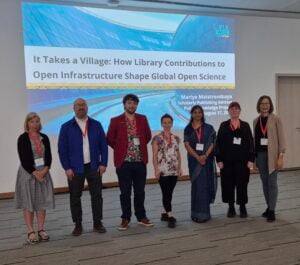Global discussion about Sustainable Paths Towards Open Science and Open Scholarship at the WLIC 2025 in Astana
27 August 2025
At the WLIC in Astana, ACD section together with LIBPUB and the Advisory Committee on Open Science and Scholarship held its Open Session with the title “Sustainable Paths Towards Open Science and Open Scholarship”. Our speakers were Mariya Maistrovskaya from Canada, Bill Ayres and Matthew McGill from the United Kingdom, and Rakhi Kumari and Ashwin Kumar Kushwaha from India. Their presentations ignited a vivid discussion about the opportunities and limits of Open Access. We would like to thank them as well as the 71 people who joined the session for their great contributions to the global discussion of Open Access!

Summeries of the presentations
It Takes a Village: How Library Contributions to Open Infrastructure Shape Global Open Science (Mariya Maistrovskaya, Public Knowledge Project (PKP), Canada)
In the pursuit of a truly equitable and sustainable Open Science ecosystem, libraries are not just participants—they are foundational builders of the infrastructure that enables global knowledge sharing. Drawing on real-world case studies, this presentation will highlight how library-led contributions to open platforms and collaborative support structures are helping grow a sustainable, scalable, and interoperative scholarly landscape. By recognizing and amplifying these contributions, we can better support a future where Open Science is not only collaborative and inclusive, but truly powered by the global community it serves.
A Model Collection – A Showcase and Framework for Capturing Physical Items as Open Digital Resources (Bill Ayres and Matthew McGill, The University of Manchester, United Kingdom)
The transformation of architectural models from physical artefacts into accessible digital and 3D resources is an essential step toward enhancing global discovery, research, and reuse. This paper addresses the need to digitise 250 models created in a renowned workshop, preserving their spatial and material qualities while enabling broader academic and public engagement. Central to this is the development of a replicable workflow and framework that can guide similar efforts worldwide. By outlining the processes, tools, and challenges involved, this project aims to support institutions in transitioning physical object collections into FAIR digital formats for long-term impact.